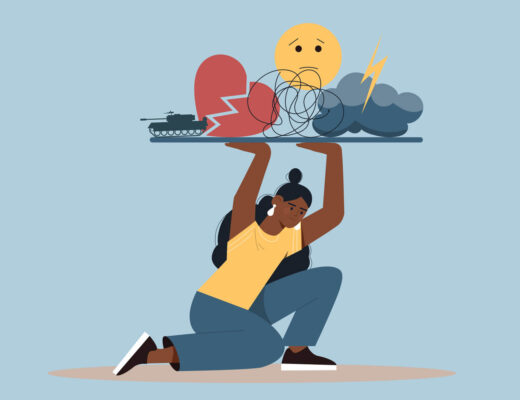Anger is a signal and one worth listening to. — Dr. Harriet Lerner, “The Dance of Anger”
Many of us seldom reflect on why something has made us angry because anger can sometimes be a quick, automatic reaction that prevents us from thinking clearly. It’s a “threat-activated neurophysiological response” with the biological purpose to protect us.
We may feel angry due to an inconvenient situation, a mental disorder or after someone mistreated us. But anger may also be a coping mechanism for when we’re feeling other emotions such as fear or embarrassment. Sometimes the reason for our anger is unclear.
Healthy Anger
Despite its negative reputation, anger is still useful. Anger isn’t always a sign of weakness or that something is off-balance with you. Some things are worth getting angry over, especially when your concerns are being overlooked. Anger doesn’t have to necessarily mean destruction; it can actually help bring attention to problems and can help you get your needs and rights met.
How you choose to express your anger, however, is most important. Not all of us can remain patient and articulate when we’re frustrated but we must all remind ourselves that anger is a feeling, not a behavior that can be managed.
We can’t always dismiss someone who is expressing their valid concerns just because they’re loud about it. As Wu (2020) points out, a justifiably angry person doesn’t necessarily have to become violent, the same way a violent person can remain cool and calm while they’re abusing someone. But either way, building our conflict-resolution skills is important.
Anger is an emotion signaling an underlying problem and it can be expressed respectfully without resorting to physical or verbal abuse. In fact, it can inspire creative solutions. For instance, research by Tavris (1989) highlights how anger has driven social change by motivating individuals to address injustices.
When used effectively, anger can foster honest communication and strengthen bonds (Kassinove and Tafrate, 2002). Anger signals the need for change and prompts us to stand up for ourselves.
Problematic Anger
If your anger outbursts are frequent and out of control, it could be a symptom of a mental health condition. Disorders such as depression, anxiety, bipolar disorder or substance abuse can lead to anger issues. It can also mean that you’re in an unhealthy environment or you have poor anger management (a short temper). This might be in relation to the way you were raised, your culture or because you haven’t yet developed other coping skills in times of difficulty and frustration.
How to identify when anger becomes a problem?
- You feel it is uncontrollable; like it is controlling you.
- It’s making you behave in disruptive, unhelpful or aggressive ways towards yourself or others (or you fear that you might become violent).
- It’s constantly affecting you, your life, relationships, work and/or people around you.
- You feel like you cannot move on with your life because of your anger.
- You often say or do things you later regret.
- Anger has become your default response to most things, preventing you from feeling your other emotions.
- You cannot recall what you said in your angry state.
- You are using substances to cope with your anger.
The long-term effects of excessive anger
A strong emotion such as anger could lead to general unhappiness, mental health disorders and social isolation if left unaddressed (Cirino, 2018). Additionally, holding onto anger puts you at a greater risk of developing auto-immune diseases. This is especially prominent among women since they’re more likely to suppress or express anger in indirect ways (Eyal, 2023).
Suppressed anger may also lead to health issues such as cardiovascular problems. A recent study found that recalling angry memories caused “temporary impairment in blood vessel dilation, lasting up to 40 minutes after the emotional trigger,” meaning: anger even affects your blood vessels’ ability to relax.
A lot of us were not taught how to use our anger effectively, instead, we may have been conditioned to suppress and resist, deny or demonstrate hostility about the way we are feeling. Fortunately, research has shown that anger management therapy can improve mental health as well as conflict-resolution abilities, communication skills and can reduce the amount of angry outbursts in people with persistent anger issues.
Practical anger control tips to help you stay calm:
- Identify Triggers & Be Mindful
Learn to recognize what makes you angry so that you can better avoid these triggers or so that you can mentally prepare yourself beforehand. One problem with intense anger is that it may disrupt regular brain processes, making you less aware of the effect it is about to have on your behavior. However, with time, practicing mindfulness and trying to understand the other person’s point-of-view will help you express anger in more constructive ways.
- Identify the “Why” & Communicate
Did your anger stem from a hurt ego, fear or grief? Can you convince yourself it’s just a petty, maybe funny, conflict that isn’t worth it in the long-run or is it a serious matter that you should attend to only after you’ve calmed down? Is it something that has been building up slowly over time due to a pattern of miscommunication? Or perhaps something made you angry and you’re taking it out on someone unrelated (known as anger-detouring)? These are natural occurances that happen to all of us. Some psychologists categorize anger as: core and defensive. Core anger is the result of a perceived violation while defensive anger is used to cover up other emotions.
Once you’ve processed the reason, communicate your feelings and needs clearly and calmly. “Expressing your angry feelings in an assertive—nonaggressive—manner is the healthiest way to express anger,” (APA, 2024). Seek constructive solutions and focus on what you can control, rather than on the things you cannot change, which will only aggravate you further.
- Try not to hide other emotions such as fear
It can be counter-productive to use anger to hide your fear (in the workplace, for example) because your anger can create fear in the person you’re talking to. So that person might also mask their fear with anger leading to an even bigger conflict. In this way, small conflicts can turn into bigger ones for no good reason. Practice communicating your concerns more honestly but respectfully. Constant anger doesn’t make people respect you, only fear you.
- Focus on what you can control
- Practice Deep Breathing: Use deep, slow breaths to calm your mind and body. When we’re angry, we usually breath in a shallow and rapid way (to increase oxygen) which makes us even more distressed.
- Take a timeout: Step away from the situation to cool down — take a walk, listen to soothing music. Once you’re thinking clearly, express your concerns in a firm but non-accusatory way.
- Exercise Regularly: Go for a brisk walk, a run or play a fun sport. Consistent physical activity has been shown to reduce stress and anger.
- Develop Problem-Solving Skills
Focus on finding solutions rather than assigning blame. Practice active listening to understand the other person’s perspective. On the other hand, don’t jump to conclusions about someone’s character based on a momentary anger outburst. Shaming a person for feeling a certain way isn’t usually an effective conflict-resolution technique. It just exacerbates the problem and conveys that you’re unable to empathize.
- Acceptance & Avoiding Rumination
Distracting yourself might help, but processing and accepting your negative feelings, instead of being afraid of them, is best for the long-term. Accept them as natural emotions that you will feel every once in a while. However, try not to ruminate over sad, regretful memories about how you were wronged. This will only exacerbate negative feelings. Forgiveness is a powerful, freeing tool. Holding grudges can weigh you down.
- Seek Professional Help
A therapist can provide support that suits your situation, goals and preferences. Sometimes our constant anger means there is a serious issue at play. Psychological disorders such as depression or a personality disorder could be the reason. These conditions are hard to treat by ourselves so finding the right therapist comes highly recommended.
Eventually, the more you get used to being mindful and aware of what works for you, the better at anger management you’ll be. This also helps build your emotional intelligence and capacity for empathy.
The goal is not to stop feeling angry; rather to be more efficient at recognizing how your feelings are about to affect you so that you can remember to use healthy, mindful ways of expressing them. Don’t let negative emotions grow and fester. Instead, focus on addressing issues directly and positively.
You can learn a lot about yourself from your anger and use that information as a tool for growth.
Whether the problem we face is a marital battle, or the escalating nuclear arms race, women and men both have a long legacy of blaming people rather than understanding patterns. Our challenge is to listen carefully to our own anger and use it in the service of change,
—Dr. Harriet Lerner, “The Dance of Anger”
If you are struggling to control your anger, or you experience intense and frequent outbursts that are considered abusive to others, please seek help from a mental health professional. This article is intended for informational purposes only.






